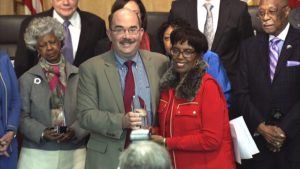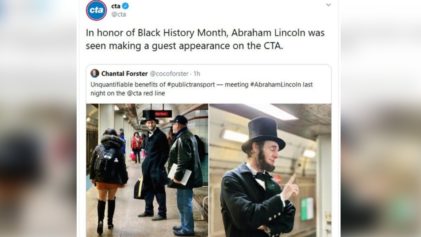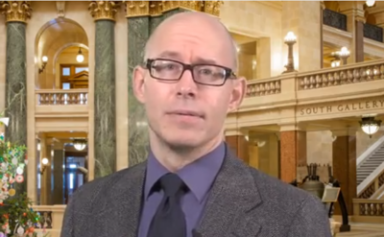
Montgomery’s history, like many other American counties, is one that is shrouded in racism and often lost behind the county’s “progressive” label.
It is a county that is often praised for what it seems to be today while many blissfully fail to acknowledge the years of struggle and oppression that came before the county was welcoming to Black faces.
It’s a history that was highlighted in the roughly 90 minutes of testimony from Black activists who called Montgomery County home even before it could proudly wear its “progressive” badge.
Council President George L. Leventhal invited the group to come share their stories with the public and serve as a reminder that even in a place like Montgomery, the phrase “Black lives matter” is not a redundant one.
Harvey Zeigler, a 95-year-old Black man who grew up during a time when many public amenities barred Black people from using them, was one of the civil rights veterans who got the chance to tell his story.
“He described his anguish at returning home in 1946, after four years in the Army, to discover that nothing had changed,” the Washington Post reported. “When he applied for membership at the American Legion, he was told that it ‘wasn’t accepting any more colored applications.’”
It was a moment Zeigler would never forget and that moment drove his decision to become more involved in the push for civil rights.
He explained that he began organizing marches to push for civil rights and fought for equal opportunity at the Atomic Energy Commission offices in Germantown.
He worked there throughout the 1960s.
Other speakers, like Odessa Shannon, opened up about the unbelievable experiences they had with white people refusing to so much as speak to them or do business with them because of the color of their skin.
During her house hunt, rumors of Montgomery being a progressive place captured Shannon’s attention and she knew the better school system would open her children up to more opportunities in the future.
Once she stumbled upon a house in Chevy Chase that was up for sale, it turned out that the county wasn’t as progressive and racially accepting as she had hoped.
The real estate agent, after spotting a Black woman coming to see the house, slipped through the kitchen window to make a quick exit.
“I’d heard Montgomery was this liberal place,” she said on Tuesday, according to the Washington Post. “But climbing out the kitchen window?”
While she did eventually find a place to settle down and call home in Colesville, she used that experience to strategically become a historical first in Montgomery.
In 1982, she won a seat on the Board of Education, making her the first Black woman in the county to hold an elected office. The secret to her success, however, was keeping her own images off of her campaign flyers in certain neighborhoods.
“They thought I was Irish,” she said.
All of the activists had a variety of different run-ins with racism and discrimination but there was always one thing that connected those hurtful experiences—they drove them to push for the type of change that has helped form Montgomery into the county it is today.
Warren Crutchfield, 78, became the first Black varsity sports coach in the county and had to constantly defend himself against white people who doubted he was really the Sherwood High basketball team’s coach.
Christine “Tina” Clarke, 76, opened up about her experience picketing a “whites only” amusement park in Glen Echo in the 60s.
Thanks to her efforts, along with the Howard University students and neighborhood residents who joined her, the facility was open to people of all color within a year.
“Growing up Black in Montgomery, it was a painful experience all around,” Clarke said.
But it’s thanks to these speakers’ sacrifices and impassioned pushes for justice that fewer Black people in Montgomery will have to experience the same kinds of disheartening tales.
As the county continues to progress today, another one of the speakers made it clear that the fight is far from over.
Craig Rice, 42, is the only Black man on the council in Montgomery and one of the many Black people who have experienced being labeled as an “oreo” because of the way he carries himself.
He says it’s a label that followed him throughout his childhood and his years at Montgomery Blair High School. He was one of only three Black students in the school’s science magnet program.
He explained that there is a reason he carries himself a certain way at all times.
“My mother told me you need to defy expectation every day you walk out of the house,” he said. “You need to make sure people don’t define you in a certain way.”
This lesson was reiterated when he was accused of shoplifting after walking out of the grocery store wearing sweat pants.
Rice says these are the types of racially charged run-ins that Black people, even in Montgomery, still deal with.
“Much has changed,” he told the crowd. “But much is still the same.”


